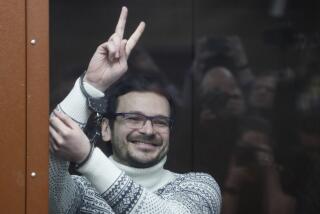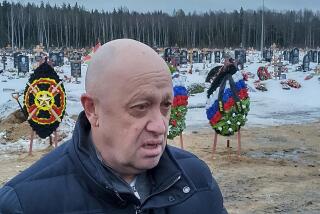Controversial Moscow Party Chief Ousted
- Share via
MOSCOW — Boris N. Yeltsin, the popular and outspoken Communist Party leader of Moscow, has been ousted from his post, stirring speculation about the effect of the move on Soviet leader Mikhail S. Gorbachev’s program of reconstruction and openness.
The Moscow party removed Yeltsin for “major shortcomings in his leadership” of the capital, the official Soviet news agency Tass announced Wednesday night. He will be replaced by Lev N. Zaikov, a member of the ruling Politburo and a Gorbachev ally, the agency said.
Ever since Yeltsin offered to resign during a stormy meeting of the Soviet party’s Central Committee on Oct. 21, his possible departure had been the subject of endless gossip and theorizing here as the party hierarchy pondered whether to accept the resignation.
One informed Central Committee member close to Gorbachev told The Times in an interview that the leadership finally decided to oust Yeltsin because, during the October meeting, the party boss directed an “irrational outburst” of criticism against the slow pace of social change in general and Politburo member Yegor K. Ligachev in particular. But the decision, he said, was complicated by Yeltsin’s prominent identification with Gorbachev’s reform program.
Yeltsin, 56, a populist in style who shunned the perquisites of his predecessors by riding the Moscow subway and meeting informally with citizen’s groups, had been viewed by many here as a champion of the new policy of glasnost, or openness. He had earned the admiration of many reformers here for his unpretentious, even maverick, style and a tendency for direct public criticism of errors in economic policy.
It was not immediately clear whether Yeltsin’s removal marked a personal defeat for Gorbachev.
Gorbachev Rebuke Seen
The move was perceived by some as a victory for party hard-liners thought to be led by Ligachev. According to one liberal editor, “This is a rebuke to Gorbachev’s policy.”
But the Central Committee member, who is a strong Gorbachev ally, said in an interview, “This has nothing to do with liberalism and everything to do with Yeltsin’s instability and grandstanding.” The official added that Yeltsin, who is also certain to be removed from his post as a non-voting member of the Politburo, first offered his resignation in an “impetuous speech, like he was having a nervous breakdown,” in the closing moments of the Oct. 21 Central Committee meeting.
That plenum had been convened to discuss the contents of Gorbachev’s speech to be delivered at the Nov. 2 celebration of the 70th anniversary of the Bolshevik Revolution. As the meeting of 600 participants was wrapping up after approximately 20 scheduled comments, Gorbachev asked if anyone else had any remarks.
At that point, according to the Central Committee member, Yeltsin rose to state that he had sent letters of resignation to both the Communist Party Central Committee and to the Moscow party committee. In offering the reasons for his resignation, the source said, Yeltsin strenuously attacked Politburo member Ligachev, the party’s No. 2 official, for what Yeltsin called his interference in efforts at perestroika, the label for Gorbachev’s economic reconstruction program.
Leading to Disenchantment
Yeltsin also criticized several lines in Gorbachev’s proposed speech, which he interpreted as a prediction of progress in the next two to three years as a result of the reconstruction policy, the Central Committee members said. Yeltsin told the shocked audience that such rosy predictions would lead to public disenchantment because the road ahead was a tough one, the source said. Gorbachev pointed out that the lines in his speech intended to convey that the next years would be trying rather than easy ones, and Yeltsin seemed mollified.
However, according to the Central Committee member, before sitting down Yeltsin leveled a parting blast at Politburo members he termed uncritical in their praise of Gorbachev. After a bit of uproar in the hall, he qualified his criticism to say he was referring to only two members of the ruling body. He then sat down, and the meeting was adjourned, with Gorbachev stating that the resignation offer would have to be considered by the local Moscow party plenum. It was that body that met Wednesday and removed Yeltsin from his post.
Pro-Yeltsin Demonstration
There has been at least one demonstration, on Nov. 6, of more than 1,000 Muscovites in favor of Yeltsin, and many Moscow liberal intellectuals identify with him as a strong supporter of glasnost. They indicate that Ligachev is a critic of glasnost who has criticized the more liberal press, and they interpret Yeltsin’s decline as a rebuke to Gorbachev himself.
But the senior Central Committee member strenuously contested this interpretation. He said that it was actually Ligachev who had first pushed Yeltsin to prominence and that Gorbachev had very little prior contact with him.
He also said that Yeltsin had been given every opportunity to withdraw his resignation gracefully and that he had ample prior opportunity as an alternate member of the Politburo to express his criticism. Ligachev, the source contended, was being made the scapegoat for what were tactical errors on Yeltsin’s part.
This same source cited the fact that Zaikov, Yeltsin’s replacement as Moscow party chief, is known to be a strong Gorbachev ally who owes his rise to power to the general secretary.
Zaikov, 64, has maintained a low profile since his election to the Politburo in March, 1986, without serving, as is the custom, in an alternate non-voting capacity.
Zaikov, who has had experience in the military sector, is known to be an advocate of rapid modernization of the Soviet economy to allow it to compete on the level of the world economy. Well-connected officials here insist that there is no ideological distance between Yeltsin and Zaikov on the key questions facing perestroika.
But there are clearly differences, at least stylistic ones. Yeltsin was known for his impatience with the pace of development at a time when Gorbachev seems bent on consolidating power and maximizing support for his controversial program.
Gorbachev’s speech on the anniversary of the revolution has been widely interpreted as an effort to reach out to a broader constituency both within the party and the state bureaucracy for support for his program. Some critics--and Yeltsin seems to have been one of them--judge this approach to be too slow and self-defeating. They argue instead for more striking demonstrations of the economic success of perestroika and criticize the party bureaucracy, including Ligachev, as exhibiting old-style caution.
On Side of Consolidation
Gorbachev came down squarely on the side of consolidation in his speech last week when he argued against both conservatives who would hold back reform and what he termed “impatient and headstrong elements,” which party insiders interpreted as a direct criticism of Yeltsin.
However, Yeltsin was one of the most popular of the party’s leaders; his frustration at the slow pace of change seemed to find much support among citizens being asked to make new sacrifices and undergo demanding changes in their economic affairs with few tangible material rewards in sight. Gorbachev has acknowledged as much in his own speeches and, for that reason, seems to have been reluctant to see Yeltsin depart.
Several sources indicated that Gorbachev did intervene after the meeting to encourage Yeltsin to withdraw his resignation. One source close to Yeltsin said Gorbachev had telephoned him the night of Nov. 6, the day of the pro-Yeltsin demonstration, to ask him to reconsider. At that time Yeltsin is reported to have insisted that Ligachev apologize as a condition for his return.
Until Wednesday night, sources close to Yeltsin expected a favorable outcome. However, an abruptly called plenum of the Moscow party leadership, addressed by Gorbachev, characterized Yeltsin’s remarks at the earlier Central Committee meeting as “politically erroneous” and, according to Tass, “relieved Yeltsin of his duties” as Moscow party boss because of what were called “major shortcomings in his leadership.”
More to Read
Sign up for Essential California
The most important California stories and recommendations in your inbox every morning.
You may occasionally receive promotional content from the Los Angeles Times.













